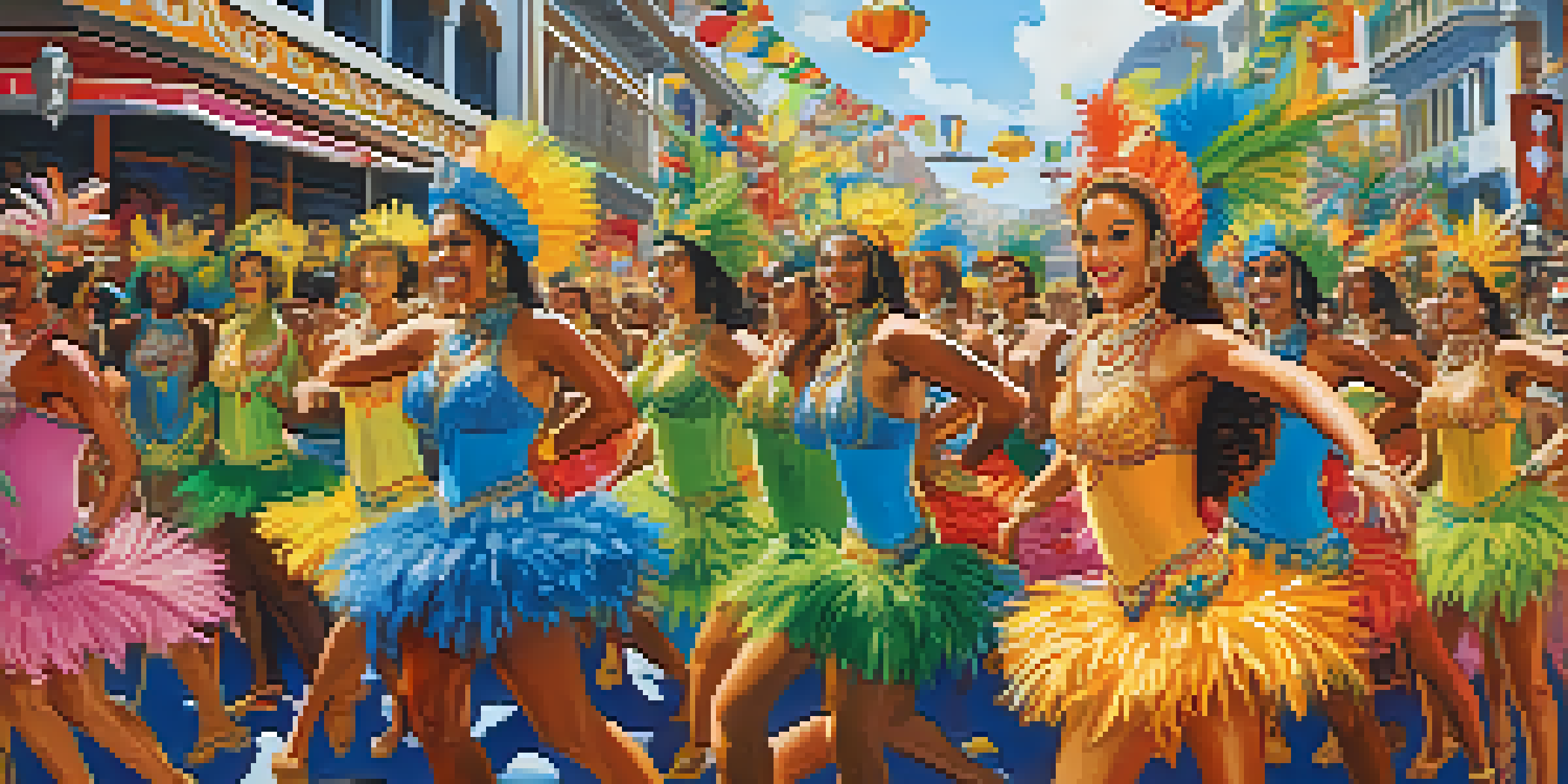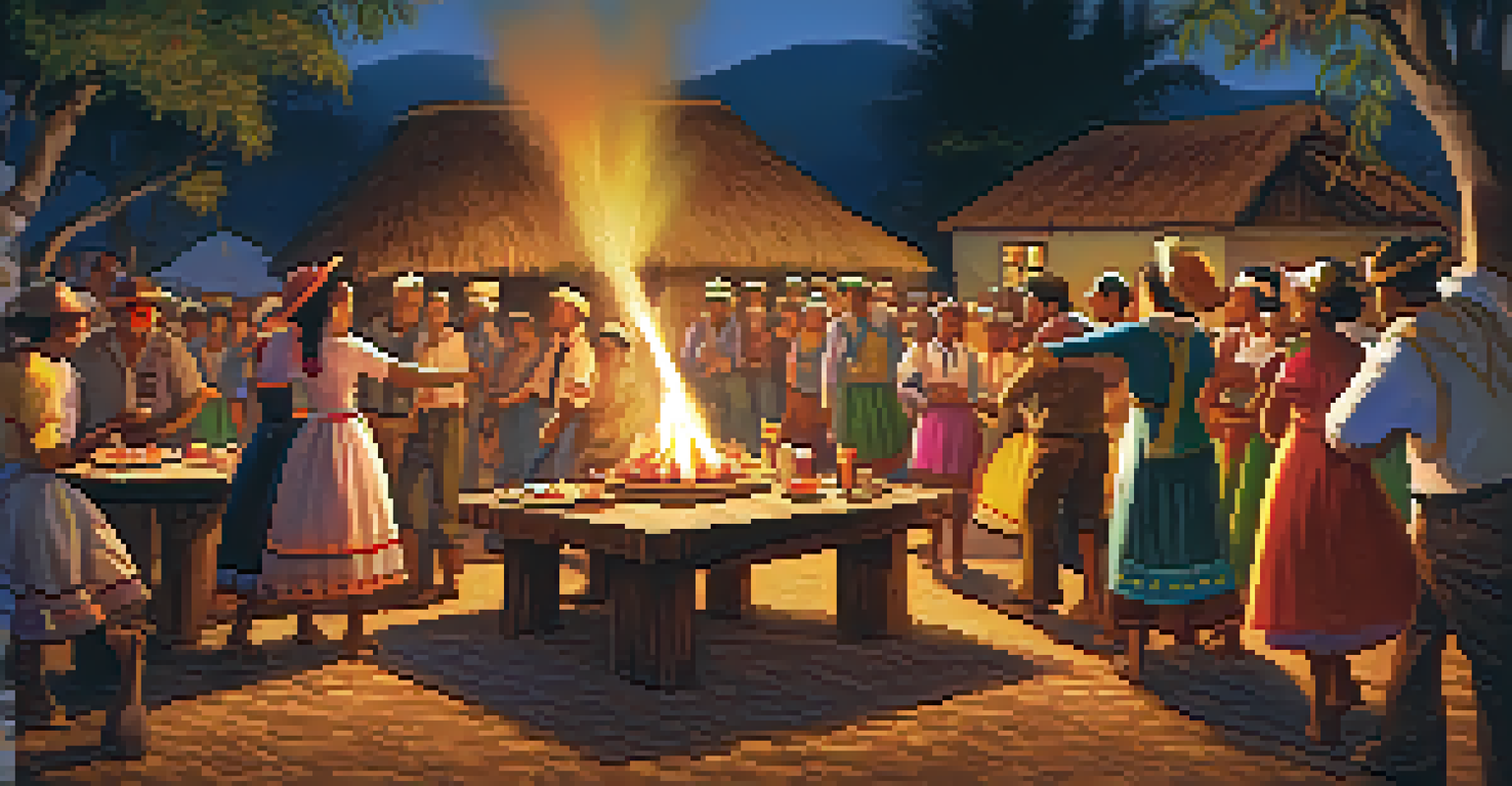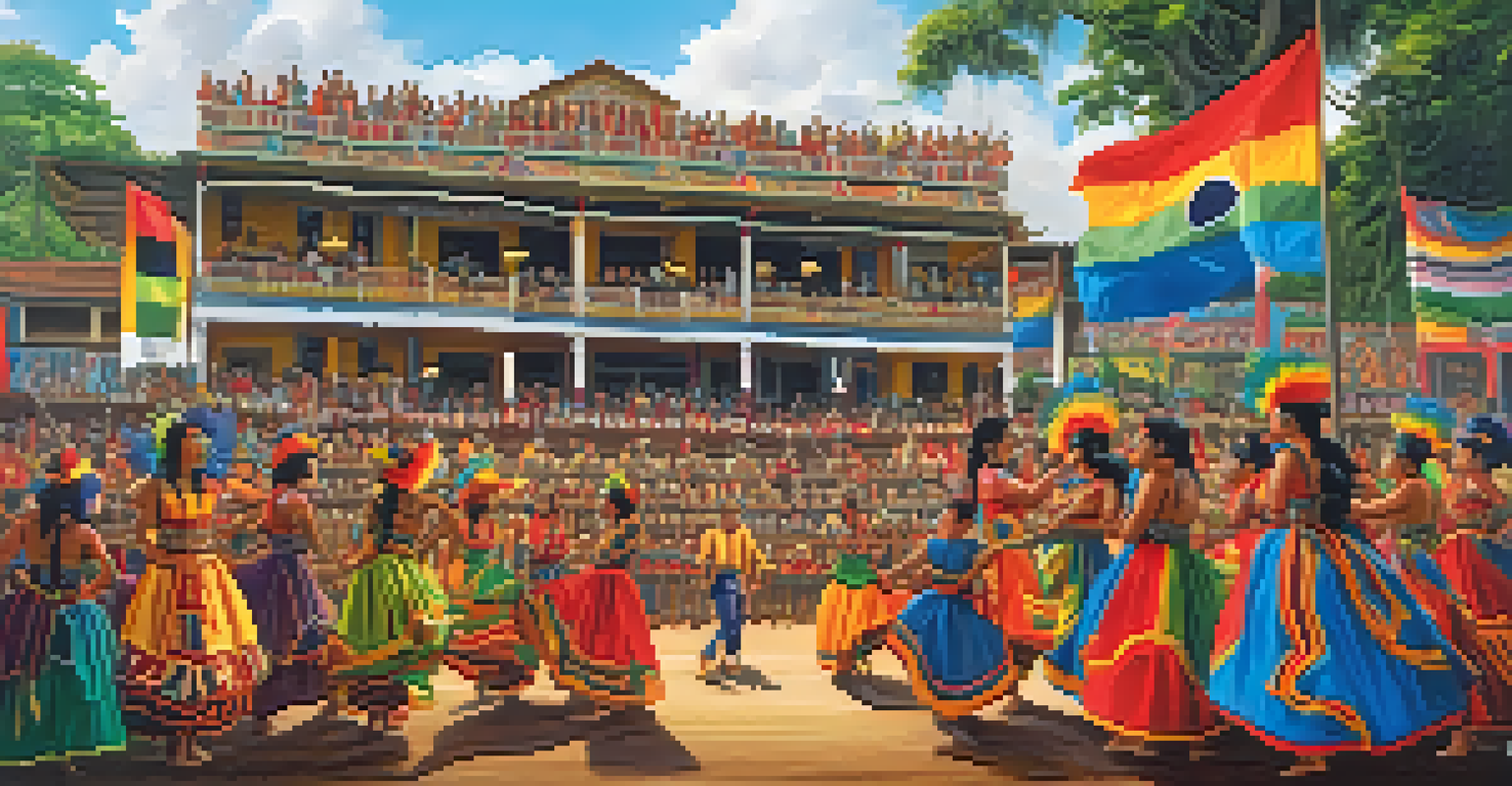Local Customs During Brazilian Festivals: A Traveler's Guide

Understanding the Heart of Brazilian Festivals
Brazilian festivals are a kaleidoscope of culture, where music, dance, and tradition converge. Each festival embodies the spirit of its region, inviting travelers to experience the rich tapestry of Brazilian life. From the lush Amazon to the bustling streets of Rio, these celebrations offer a unique glimpse into local customs and community bonds.
Festivals are a way to connect with the past and celebrate the present.
The most famous festival, Carnival, showcases the exuberance of Brazilian culture with its parades, samba music, and elaborate costumes. However, lesser-known festivals, like Festa Junina, also deserve attention for their authenticity and local flavors. Understanding these events is key to immersing yourself in Brazilian culture and connecting with its people.
As you plan your travels, keep in mind that festivals can vary greatly from region to region. The local customs you encounter will provide insights into the history and values of the communities you visit. By participating in these festivals, you’ll not only enjoy the festivities but also create lasting memories with the locals.
Carnival: The Spectacle of Rio de Janeiro
Carnival in Rio de Janeiro is perhaps the most iconic festival in Brazil, attracting millions of visitors each year. The celebration typically occurs before Lent, featuring samba parades, street parties, and vibrant costumes. It’s a time when locals and tourists alike join in the revelry, making it a truly unique experience.

During Carnival, samba schools compete in elaborate parades, showcasing their creativity and cultural heritage. Watching these performances is an awe-inspiring experience, as dancers and musicians pour their hearts into every step and note. To fully appreciate Carnival, consider participating in a local blocos (street party) to dance alongside the locals.
Festivals Reflect Brazilian Culture
Brazilian festivals, from Carnival to Festa Junina, showcase the country's rich traditions and community spirit.
While Carnival is grand and famous, remember that it can also be overwhelming. Embrace the chaos but also take moments to enjoy the smaller street parties that offer a more intimate glimpse of local traditions. This balance will allow you to experience the true essence of Carnival while making meaningful connections.
Festa Junina: A Celebration of Rural Traditions
Festa Junina is celebrated in June across Brazil and honors rural life and the harvest season. This festival is characterized by traditional foods, vibrant decorations, and folk dances such as the quadrilha, resembling a square dance. It’s a wonderful opportunity to experience Brazil’s agricultural roots and the warmth of community spirit.
The beauty of culture is that it is always evolving, yet it carries the essence of tradition.
During Festa Junina, locals dress in rustic costumes, often resembling farmers and country folk. The atmosphere is lively with music, dance, and the aroma of delicious foods like pamonha (corn pudding) and canjica (sweet corn porridge). Participating in these festivities allows travelers to savor authentic Brazilian flavors and traditions.
In contrast to Carnival’s extravagance, Festa Junina has a more homespun feel, making it a cozy and inviting experience. This festival is an excellent chance to engage with local customs and learn about the importance of agriculture in Brazilian culture. By joining in, you will not only enjoy the festivities but also appreciate the stories and traditions passed down through generations.
Oktoberfest in Blumenau: A Brazilian Twist on Tradition
Blumenau hosts one of the largest Oktoberfest celebrations outside Germany, showcasing the influence of German immigrants in Brazil. This festival blends traditional Bavarian customs with Brazilian flair, featuring polka music, beer, and hearty food. It’s a unique opportunity to experience a cultural fusion that highlights the diversity of Brazil.
Visitors can enjoy traditional German dishes like sausages and pretzels, but with a Brazilian twist, such as feijoada (black bean stew) served alongside. The festive atmosphere is contagious, with locals and tourists donning lederhosen and dirndls, dancing, and toasting to merriment. Engaging in this festival allows you to appreciate the shared history and camaraderie among cultures.
Carnival Offers Unique Experiences
Rio's Carnival invites both locals and tourists to immerse themselves in vibrant parades and street parties.
Oktoberfest in Blumenau is not just about beer; it's a celebration of community and tradition. Attending this festival offers a chance to connect with locals who preserve their heritage while embracing new influences. So raise a glass and join in the fun—it's a celebration you won't want to miss!
Dia de Finados: Honoring the Departed with Respect
Dia de Finados, or Day of the Dead, is a solemn yet deeply meaningful festival observed in Brazil on November 2nd. Unlike the lively celebrations of Carnival, this day is dedicated to honoring deceased loved ones. Families gather to visit cemeteries, bringing flowers, candles, and food as offerings to celebrate the lives of those who have passed.
During this time, it’s common to see beautiful floral arrangements and decorated graves, creating a poignant atmosphere of remembrance. Local customs vary, with some families preparing special meals that their loved ones enjoyed. Participating in this festival invites travelers to reflect on the importance of family bonds and the cultural significance of honoring ancestors.
While Dia de Finados may not be a festive occasion in the traditional sense, it offers a rich insight into Brazilian values surrounding life and death. Engaging in this observance with respect and understanding can foster a deeper connection with the local community. It’s a reminder that every culture has its unique way of celebrating life, even in its absence.
Parintins Folklore Festival: A Celebration of Amazonian Culture
The Parintins Folklore Festival, held in the Amazon region, is a vibrant celebration of local culture and folklore. This festival features the legendary rivalry between two groups, Garantido and Caprichoso, who perform elaborate theatrical shows that bring to life the stories of the Amazon. It’s a spectacle of music, dance, and artistry that captivates audiences from around the world.
During the festival, the townsfolk transform into performers as they showcase their rich heritage through colorful costumes and captivating performances. The atmosphere is electric, filled with cheers, drums, and the spirit of competition. Attending this festival allows travelers to dive deep into the heart of Amazonian culture and witness the pride of the local community.
Respect Local Customs at Festivals
Understanding and participating in local etiquette enhances the festival experience and fosters meaningful connections.
Engaging with the Parintins Folklore Festival is not just about watching; it’s about participating and celebrating alongside the locals. Whether you’re dancing in the streets or cheering for your favorite team, you'll feel the infectious energy that brings everyone together. This festival beautifully illustrates how traditions can thrive in the modern world, making it a must-see for any traveler.
Local Etiquette: How to Respect Brazilian Customs
When attending Brazilian festivals, understanding local etiquette is crucial for a respectful and enjoyable experience. Greetings often involve warm hugs and cheek kisses, reflecting the friendly nature of the Brazilian people. A smile and a simple 'Olá' (hello) can go a long way in connecting with locals and making you feel welcome.
Additionally, dress codes can vary depending on the festival. For instance, at Carnival, vibrant costumes are encouraged, while more subdued attire may be appropriate for solemn events like Dia de Finados. Being mindful of these customs not only shows respect but also enhances your experience as you blend in with the celebrations.

Lastly, be open to joining in the festivities! Brazilians are known for their hospitality and love for sharing their culture. Whether it's dancing the quadrilha at Festa Junina or participating in a samba circle, your willingness to engage will create memorable interactions. Embracing these customs will enrich your travel experience and forge connections that last long after the festival ends.